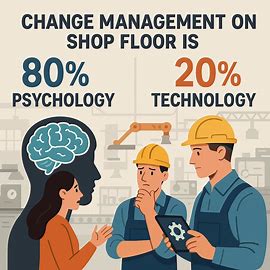WHY CHANGE MANAGEMENT ON SHOP FLOOR IS 80% PSYCHOLOGY AND 20% TECHNOLOGY
What goes on in employee mind when you propose change as an entrepreneur, and how to handle it
Savita Morale
10/5/20252 min read


In my consulting career, I’ve worked closely with several manufacturing companies—from stone processing units to medium-sized factories implementing automation. One truth has become very clear to me: change management in manufacturing is less about technology and more about psychology.
I’ve seen brilliant machines installed, ERP systems implemented, and new workflows designed—but they failed to deliver results because people on the shop floor resisted. At the same time, I’ve also seen modest changes succeed, simply because employees felt included, respected, and prepared.
The Psychological Side of Change Management
When change is announced in a manufacturing setup, I often notice a familiar pattern:
hashtag#Fear of Job Loss: Workers assume automation means layoffs.
hashtag#Loss of Control: Supervisors worry that new systems will expose inefficiencies.
hashtag#Comfort with Routine: Employees who have worked the same way for 10–15 years feel threatened by disruption.
In my experience, these reactions are natural—and ignoring them is the biggest mistake management can make. Machines may be predictable, but human behavior is complex.
How I Handle Resistance as a Consultant
I approach change in manufacturing with a people-first strategy:
hashtag#Communicate the “Why”: I insist that management explains why the change is happening and how it benefits not just the company, but the employees too.
hashtag#Involve Shop Floor Workers Early: Whenever I include operators in discussions, they feel ownership instead of fear.
hashtag#Upskill and Reassure: Training programs remove insecurity. When workers see they are being developed, they stop fearing replacement.
hashtag#Phased Rollouts: I’ve found gradual implementation builds confidence and reduces downtime.
hashtag#Recognition: Rewarding early adopters motivates others to follow.
This psychological approach not only reduces resistance but also builds long-term trust between management and workers.
The 20% Technology Factor
Of course, technology matters. Without automation, digital tools, and lean methods, manufacturing industries cannot stay competitive. But in my view, technology delivers results only when the human side is aligned. A factory with disengaged workers will never fully utilize even the most advanced system.
In every project, I remind management teams that successful change is 80% psychology and 20% technology. Machines don’t resist change—people do. And once people are included, trained, and motivated, change doesn’t just happen—it sticks, and it drives growth.
This is the lens I always use as a consultant, and it’s what makes the difference between failed transformations and sustainable success.
LABDHI HR
LABDHI HR STRATEGIES AND SERVICES
consultant@labdhihr.com
+91 8424815548
© 2024. All rights reserved.
Registered Office Address:
We Work, Oberoi Commerce II , Goregaon East, Mumbai,Maharashtra,India-400063
